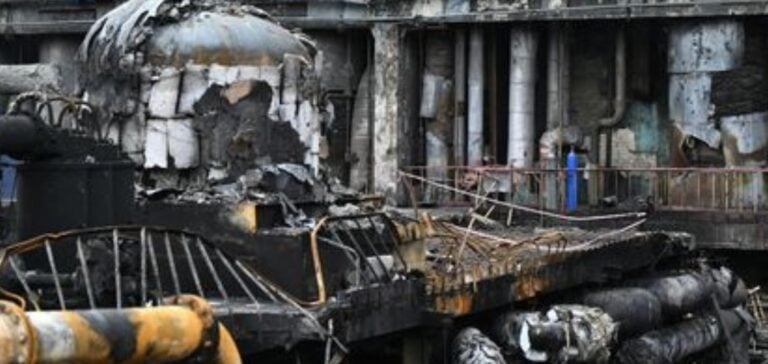Recent Russian attacks have dealt a severe blow to Ukraine’s energy infrastructure, damaging a power plant and injuring seven employees. This offensive, described as “massive” by the energy operator DTEK, is part of a series of attacks over the last three months, forcing Ukraine into recurrent and penalizing power cuts. According to DTEK, this seventh attack specifically targeted one of their thermal power plants, causing considerable damage and injuring three of their employees. The Ukrainian Ministry of Energy said that infrastructure in four regions, including Kiev, had been affected. Authorities reported that seven employees were injured, one of them seriously, but gave no further details of the extent of the damage.
Escalating attacks
These strikes are intensifying as the Russian army has fired nine missiles and 27 suicide drones of Iranian origin, most of which were shot down by Ukrainian forces. Ukrainian President Volodymyr Zelensky said that half of the country’s energy capacity had been destroyed, leaving Ukraine more vulnerable as winter approaches. DTEK Managing Director Maxim Timchenko warned that Ukraine could face a serious energy crisis this winter if Western partners don’t step in to help rebuild the power grid. In an appeal to Ukraine’s allies, Timchenko stressed the urgent need for support in defending and restoring the country’s energy system.
Reactions and counter-attacks
Kiev has urged the West to step up its efforts to provide anti-aircraft defenses and help rebuild the power grid. Russia, while denying targeting civilians, has admitted to targeting energy infrastructure in response to Ukrainian attacks on its own fuel facilities. At the same time, Ukrainian drones struck several oil depots in Russia, notably in the Krasnodar region, killing one woman, and started fires at refineries in the Republic of Adygea and the Tambov region. The Ukrainian special services (SBU) claimed that these refineries were used by the Russian army, suggesting that such attacks would multiply.
Impact on Conflict Regions
Russian bombardments continue in regions close to the front line, notably in southern and eastern Ukraine. Local authorities in Kherson and Kharkiv have reported several casualties as the fighting intensifies. In the Donetsk region, Russian forces are attempting to seize strategic positions, endangering civilians and further complicating the humanitarian situation. This offensive underlines Russia’s strategy to weaken Ukraine by targeting its critical infrastructure, exacerbating the country’s energy challenges and requiring a coordinated international response.
The situation remains critical, and Ukraine, faced with power cuts and increasingly difficult conditions, depends on the continued support of its allies to overcome this crisis.






















